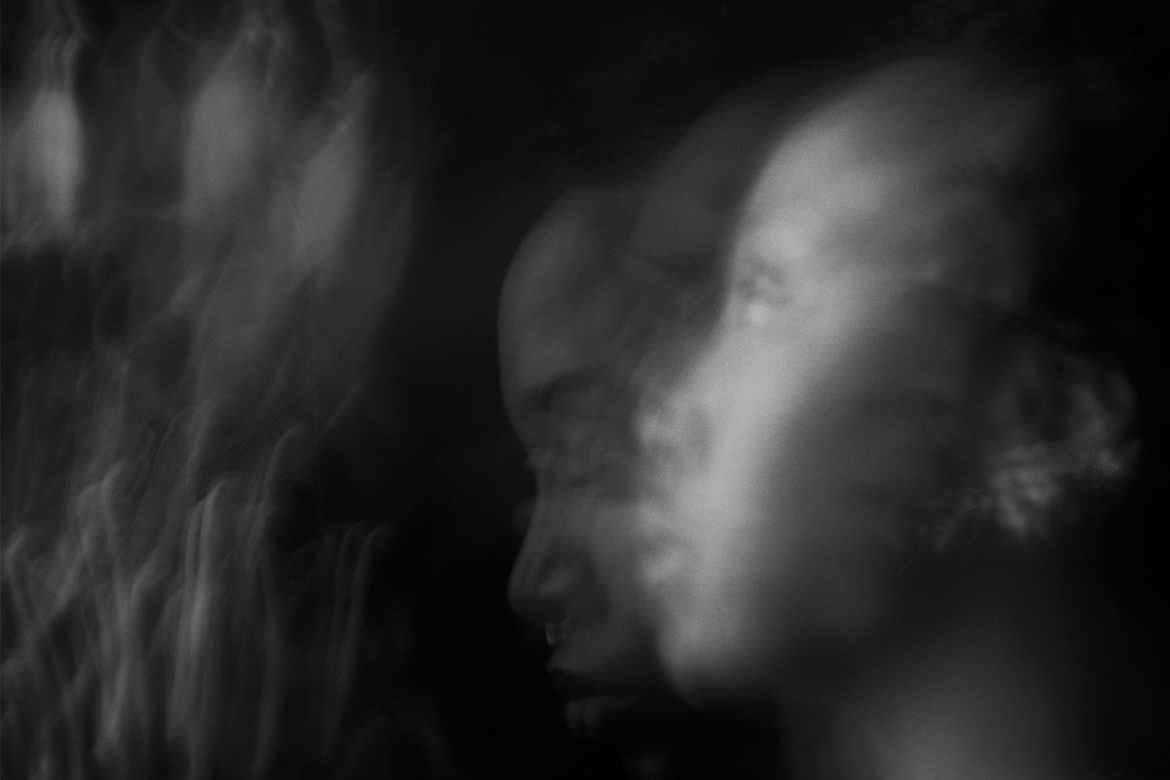“The permission to imagine leaving.“
Until now, Niecy Blues has been defined by small collection of tracks that suggest multiple directions: idiosyncratic pop and R&B on “Ways”, submerged vocal drone on CRY, or the crafty union of the two on “Bones Become the Trees”. Her new album comes through the illustrious Kranky records, bringing Blues onto a roster with established artists like Christina Vantzou and Grouper. Exit Simulation brings her into this fold with a unique voice and approach to composition, and makes for comforting yet compelling listening as we descend into the winter of 2023.
The lead single “Violently Rooted” is perhaps a good example of the style that Blues has settled on: mellow instrumentation that supports her voice, which has been layered and spun, from your ear to the distant horizon. Dry percussion forms a steady beat from just two or three samples. The bass is humble but highly present, with a soft low-end and gentle highs, whilst subtle keys or plucks provide melody that doesn’t steal the limelight. That limelight is all for Niecy Blues’ voice, which on “Violently Rooted” comes first in gentle, breathy waves. This becomes the track’s key motif as it’s joined by a chorus of herself, in a deliberate muddle, loose in its timing. Her voice in the verses is distinct as she pulls the microphone close, becoming spirited in the second verse. She is uniquely suited for this sort of magic, with a talented and controlled voice that embraces the natural incidentals. The title track “Exit Simulation” continues this trend, led by bass arpeggios and more ensemble voices, plus a slow outro that wanders as far as its samples charted.
It’s actually on the back half of the record where most similar tracks can be found, where they feel the most focused on being distinct compositions. “The Architect” is rhythmic delight, with Blues’ take on a Thom Yorke-esque percussive shuffle, now with vocals that could turn ice to air. “Analysis Paralysis” has these little verses that are budding with happiness, and the record’s most ‘proper’ choruses. These are catchy in their own way, swelling from just one voice. The self-made, one-voice choir parts are instead in the verses, a clever switch where all the voices attempt to be quieter than one another.
Structurally, these songs will often surprise you, especially the front half of the record. “The Nite B4” is an acoustic ballad sent through a poster tube for its reverb space, and despite seeming to stretch on like a telescope, it ends quite abruptly. “Exits” features Mary Lattimore, contributing harp plucks to an otherwise almost fully vocal track. “Soma” is fully fledged and structureless, swelling from Rhodes-style keywork and tranquillity towards the record’s loudest volumes, introducing pirouetting wind instruments on the way. A set of much shorter ideas follow: “Messages From Above” is a little bass interlude with some odd samples, and “Lament” is its dark companion that watches a tremolo-ed sample get slowed to the tune of distant gongs. “Violently Rooted Reprise” is the vocal comeback smeared over snyths doing something indistinct, whoozy, and undulating.
“U Care” is the record’s most curious moment, an extensive and slow-burning song, providing a canvas for Blues’ articulate vocals and phantom choirs. Even stranger is the ending, exchanging the haunting guitar for a rough sample from what sounds like the best gig ever. It’s a balm after an emotionally ambiguous track. Another oddity is the closer “Cascade”, built on a pair of simple acoustic chords. I’d have liked a grander ending for the record, but the bass plays us out charmingly over a minute long fade-out. These moments are reminders that the record has chosen spontaneous and improvisational qualities over immediate gratification.
My take, as an ambient music savant, is that this is a stunning record with an uncommon approach that should be celebrated. However, Niecy Blues goes beyond this, as she has pulled in much wider influence than ‘ambient’ would imply, particularly in art pop, R&B, gospel, and worship music. The timbre and space of the church as a performance space is a huge influence on this record that even secular ears should pick up. It should also be recognised that Blues brings a black voice to a genre where identity is often an afterthought. I expect I’ve not truly picked up on these influences to the extent that they deserve to be observed, so in this instance I particularly encourage you to seek out further reviews of Exit Simulation for additional perspectives. I hope this record is widely appreciated and marks the start of a storied musical career for Blues.
8/10
Exit Simulation releases this Friday 10th November through Kranky records and can be pre-ordered here: US/UK.

